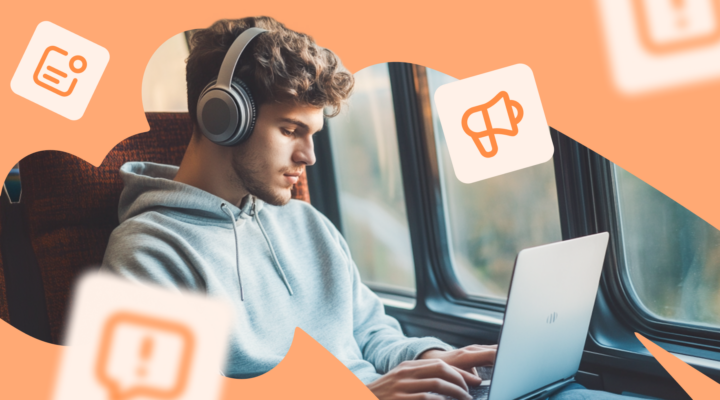Social media’s popularity continues to gain momentum, as more than half of the modern global world population has socials. As a result, it’s no wonder that bloggers around the world resort to adding a range of social media to their content marketing strategy. However, it’s not a cornerstone of successful blogging and affiliate campaigns.
Why travel bloggers use social media
If you find yourself undecided about whether or not to incorporate social media into your personalized marketing strategy, consider the following list of pros and cons.
Pros of using social media for bloggers
- Wider exposure. With almost 5 billion users all around the world, social media offers access to all kinds of audiences and can help you reach your target customers from the comfort of your home. An increased online presence may lead to higher traffic and revenue.
- Networking. Social networks also provide opportunities to connect with thousands of other bloggers and influencers who are looking to build their presence, just like you. By networking, you can discover more partnership opportunities and grow your business faster.
- Higher audience engagement. Social media enables you to interactively connect with your audience in a casual environment, understand their pain points and desires, and gather their feedback.
- Targeted advertising. Most social networks provide advanced targeting options that allow you to reach your ideal customer by setting the desired demographics, interests, and more.
- Personal connection. As social media allows for direct communication, these platforms can also help you build trust with your audience. People might be more likely to leave comments and contact you on social media than via email, especially if they see that you are actively responding to feedback from your audience.
- Built-in analytics. Platforms, such as Instagram and Facebook, have advanced analytics features that provide insights on your audience’s demographics, behavior, and more, which can help you promote your content more efficiently.
However, it’s not that simple, and running social media marketing often has its downsides. Below are some of the most common shortcomings of social media marketing:
Cons of using social media for bloggers
- Customers vs Competition. If you don’t have thousands of followers yet, there is a high chance that you are promoting your content to your direct competitors, who, just like you, are building an online presence and studying the niche.
- Time-consuming. With so many social networks out there, it might be tempting to create and promote accounts on as many of them as possible. However, each platform operates on a specific algorithm, and especially if you’re managing them yourself without assistance, you could end up spending hours or days trying to cater to each one.
- Limited reliability. Social networks are third-party platforms that can be taken down at any time. In addition, they often experience traffic fluctuations, for example, due to political restrictions or changes in algorithms. In contrast, traffic from search engines is most reliable and search algorithms do not change very quickly.
- Easy to get suspended. Have you read those recommended guidelines before creating a social media account? Every day, hundreds of accounts are suspended or even deleted because of policy violations, which often happen simply as a result of ignorance regarding the platform’s policies.
- Requires a lot of effort. Social media marketing has an apparent simplicity, but oftentimes, it requires dedicated work that requires you to research your audience, create quality content, post almost daily, and promote it in all ways possible.
- Requires regular promotion. With the average number of accounts a user follows being 150, it is easy for a post to get lost in someone’s news feed. To make sure your new post reaches your following, you might need to invest into regular advertising and dedicate time to engage your audience.
Does a travel blogger need to make time for social media? Content creators’ opinions
Now that we have discussed the advantages and disadvantages of using blog social media, let’s hear about the preferences and hands-on experiences of some travel bloggers.

Johanna MacGregor, The Tokyo Chapter (Instagram)
I know of many travel bloggers who only use Instagram (and use their Instagram as a “blog” in itself) and also plenty of travel bloggers who only use their website to post and completely ignore social media altogether. And I’ve seen both be quite successful.
But I do believe that those who are able to make use of both – in different ways – are making the most of their own brand and business.
To expect both a website and a social media account to perform for them in the same way? Well, this would only lead to disappointment and frustration.
For me, my website is where I put all of my hard work- the nitty gritty details that can then be updated and edited as things change and evolve.
But social media is where I build my community. I let people get to know me and I can also find out what my audience wants from me and what their current pain points are.
The website is an information source while social media is the meeting room for discussion and dialogue between myself and my readers.
My website is for the preplanned, researched info. Social media allows me to share spur-of-the-moment thoughts and then open up that as a new conversation.
I don’t think it really matters whether you start with social media and then a website or the other way around, either.
I think having both builds trust and authority and also I don’t understand why everyone wouldn’t want to jump in on any chance to improve visibility in as many places as possible.
Sarah Chant, New Zeland Travel Tips, (Facebook)
We’ve had massive success leveraging our Facebook group so definitely recommend those. They’re also a lot of work though, so you want to be committed.


Wendy White, Western Australia Expert
I get a bit of traffic from Pinterest and Facebook but still nothing compared to SEO even with my traffic tanking after the HCU.
Zhou Zhenru, A Love Letter to Asia
That you don’t need social media to make a full-time income from blogging. And that some personalities are better suited to social media, whilst others are better suited to blogging!


James Cutajar, Bangkok on My List
Even if you do get significant engagement from social media, it would require frequently posting because old posts don’t generally keep showing for a long while.
On the other hand, some content creators prefer blogging without a social media presence. For example, Shelley Marmor of Travel Mexico Solo was able to achieve a six-figure blogging income with zero social media, which she talked about in detail in this webinar.
Social media and affiliate marketing – is it effective for a travel blogger?
Building a website or blog provides more reliability, flexibility, and space for creativity, especially if you want to monetize your content with affiliate marketing. Social networks tend to be wary of affiliate links, while sharing them on your own platform is often easier and more reliable. Most affiliate programs create special tools to help marketers generate clicks, such as widgets, which are designed for websites and not social media.
Having a blog also provides more opportunities to earn, such as sharing sponsored content, promoting your product, selling premium memberships, and more.
At Travelpayouts, we conducted an analysis to determine which content projects our partners earn the most from websites only, social media only, or both. Here are some interesting numbers:
- The majority of partners who generate income from content projects work only with websites, constituting 74% of the total partners earning through websites only, social media only, or both. Meanwhile, partners using only social media accounted for 7%, and those using both websites and social media platforms accounted for 19%.
- When it comes to bookings, partners with websites dominate, contributing to 83% of the total bookings from partners utilizing websites, social media, or both. On the other hand, partners leveraging social media exclusively generate only 3% of bookings.
- Partners focusing solely on websites earn, on average, 117% more than those exclusively promoting brands on social media and 41% more than partners utilizing both websites and social media.
While social media marketing has several pros and cons, it’s ultimately up to yourself to determine which social networks (if any) are worth investing your time and effort into.
Do you use social media to support your affiliate campaigns or blogging? What advantages and disadvantages of social media marketing have you encountered on your blogging journey? Feel free to share your experience in the comments below.



